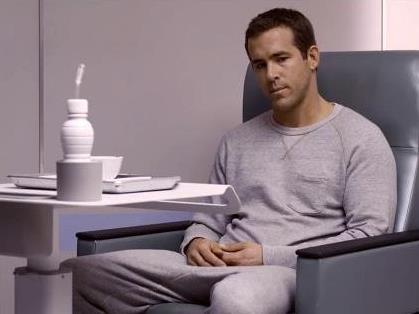Image: www.ritzcinema.com.au
A character cycles through several bodies and behavioural traits, and the film he’s in rotates through more plots and predicaments – the former seeking a longer lease on life, the latter scouring for an engaging narrative for dramatic science fiction movie. So sputters along Self/Less, a feature that, like its protagonist, sometimes feels identity- and personality-less. He’s struggling with who he’s meant to be, and it’s wrestling with what it wants to achieve. Both try to dress up old parts with shiny new packaging, with varied results.
The person in question is Damian Hale (Ben Kingsley, Night at the Museum: Secret of the Tomb), a cancer-ridden New York real estate mogul with a business partner (Victor Garber, Big Game) he’s made rich, a non-profit-worker daughter (Michelle Dockery, Non-Stop) he’s neglected, and has a date with death in less than six months. Then a business card appears in his wallet, teasing a solution to mortality through the services of the mysterious Albright (Matthew Goode, The Imitation Game), a slick neuroscientist able to transport the consciousness of great minds into younger, healthier, supposedly lab-made specimens – for a cost.
Through a process known as shedding, Damien becomes Edward Kitner (Ryan Reynolds, Woman in Gold); however the fun of being fit, agile and sexually attractive comes with seizure-inducing, flashback-like consequences. Images of a wife (Natalie Martinez, Broken City) and daughter (newcomer Jaynee-Lynne Kinchen) Damien doesn’t know begin to stick in his memory, sparking a quest to decipher their meaning, and then to a race to outrun those unhappy about his search.
Though its premise shows promise that should prove otherwise, the story at the centre of Self/Less is one of the film’s least successful elements, predicated as it is upon an interesting idea fleshed out only as far as other sci-fi and body-swap efforts have gone. Writers and siblings David and Àlex Pastor (Los últimos días) sketch out their script with 1966’s Seconds clearly in mind, but when that – and the other features it has inspired over the past half-century – can’t provide enough content, they switch to action-thriller mode mixed with lashings of family issues. Pondering technology’s role in eradicating humanity’s transient existence is intriguing, as is contemplating the moral ramifications and social repercussions; watching generic chase and bonding scenes served up instead is not.
Accordingly, director Tarsem Singh is charged with the task of enlivening meandering, muddled material, a feat he achieves sans his usual aesthetic aplomb. Self/Less always feels active, even if the style so integral to Singh’s previous films – both good (2000’s The Cell, 2006’s The Fall) and not so (2011’s Immortals, 2012’s Mirror Mirror) – is swapped for standard Hollywood sheen. When glimmers of the usual flair are glimpsed in the noises of New Orleans mixed into a hedonistic melange, and similarly sighted in a kinetic mid-film shoot-out, they provide the movie’s most striking moments, offering flashes of a different feature trying to get out.
Nestled between a tale that underwhelms and a sense of style that too infrequently overcompensates sits performances that fall competently in the middle, hitting the marks signposted by the screenplay well in advance, acquitting the actors adequately, yet never approaching anything memorable. Kingsley brings seriousness and Reynolds charm, and while they can’t quite fit together, they make their shared character a sympathetic-enough presence. That’s the best Self/Less can be, its protagonist and its end result both watchable, but laden and layered with too many – and too fluttering and flimsily constructed – components.
Rating: 2.5 stars out of 5
Self/Less
Director: Tarsem Singh
US, 2015, 117 mins
Release date: July 23
Distributor: Roadshow
Rated: M
Actors:
Director:
Format:
Country:
Release:





